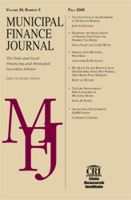Complete Issue (Winter 2021)
Author: W. Bartley Hildreth.
Source: Volume 41, Number 04, Winter 2021 , pp.1-86(86)

< previous article |return to table of contents
Abstract:
State and local governments grant tax incentives that seek to encourage economic development through the abatement of certain tax payments for an agreed upon period, with financial implications for that jurisdiction and potentially others. Adequate disclosure of these arrangements in financial statements is the subject of a particular government accounting rule (GASB 77) that bestows discretion on the reporting entity beyond certain minimum standards. Public affairs professor Geoffrey Propheter surveys Colorado local government after two years of the standards and finds higher than minimum reporting but problems flowing from the allowed discretion. Although the standards are useful, the unintended consequences and reporting oversights suggest to the author that “it will remain unclear to financial report users how much of the tax incentive iceberg is below the water line.” Although bond insurance does not play as significant a role in the municipal securities market as it used to, there is value in studying this ongoing market segment. Finance professor Earl D. Benson and accounting professor Barry R. Marks examine changes in the Texas municipal bond insurance market. Their findings underscore the importance of bond insurance to lower rated, smaller size transactions and those issued by municipal utility districts. After Congress prohibited advance refunding for tax-exempt bonds in 2017, issuers turned to taxable bonds, which retained their advance refunding option. Financial analyst Andrew Kalotay offers a critical examination of this option. The analytical techniques and scenarios provide cautionary guidance for issues considering the taxable bond route while conveying the benefits accruing to the U.S. Treasury. Cash remains king, but management of cash flows matters. Public administration faculty member Michelle L. Lofton offers a typology of working capital management strategy, and tests it on local governments finance officers in New York. Survey evidence reveals a preference for using unrestricted cash before external sources of financing, with differences by type of local governments.Keywords: GASB Statement 77; bond insurance competition; Taxable Advance Refundings; Municipal Cash Flow and Working Capital Management
Affiliations:
1: Journal Editor.